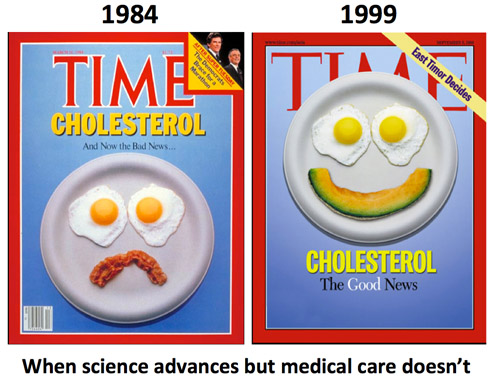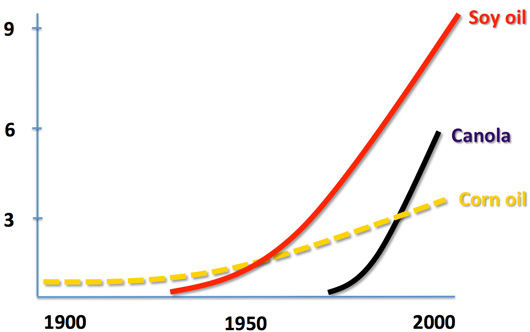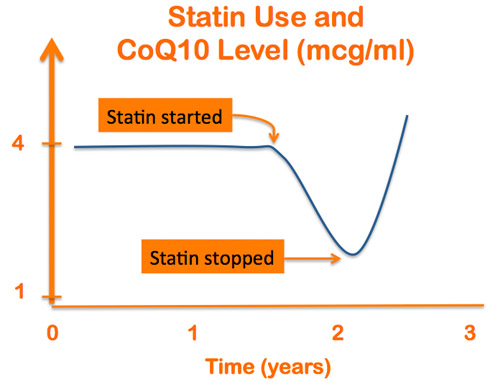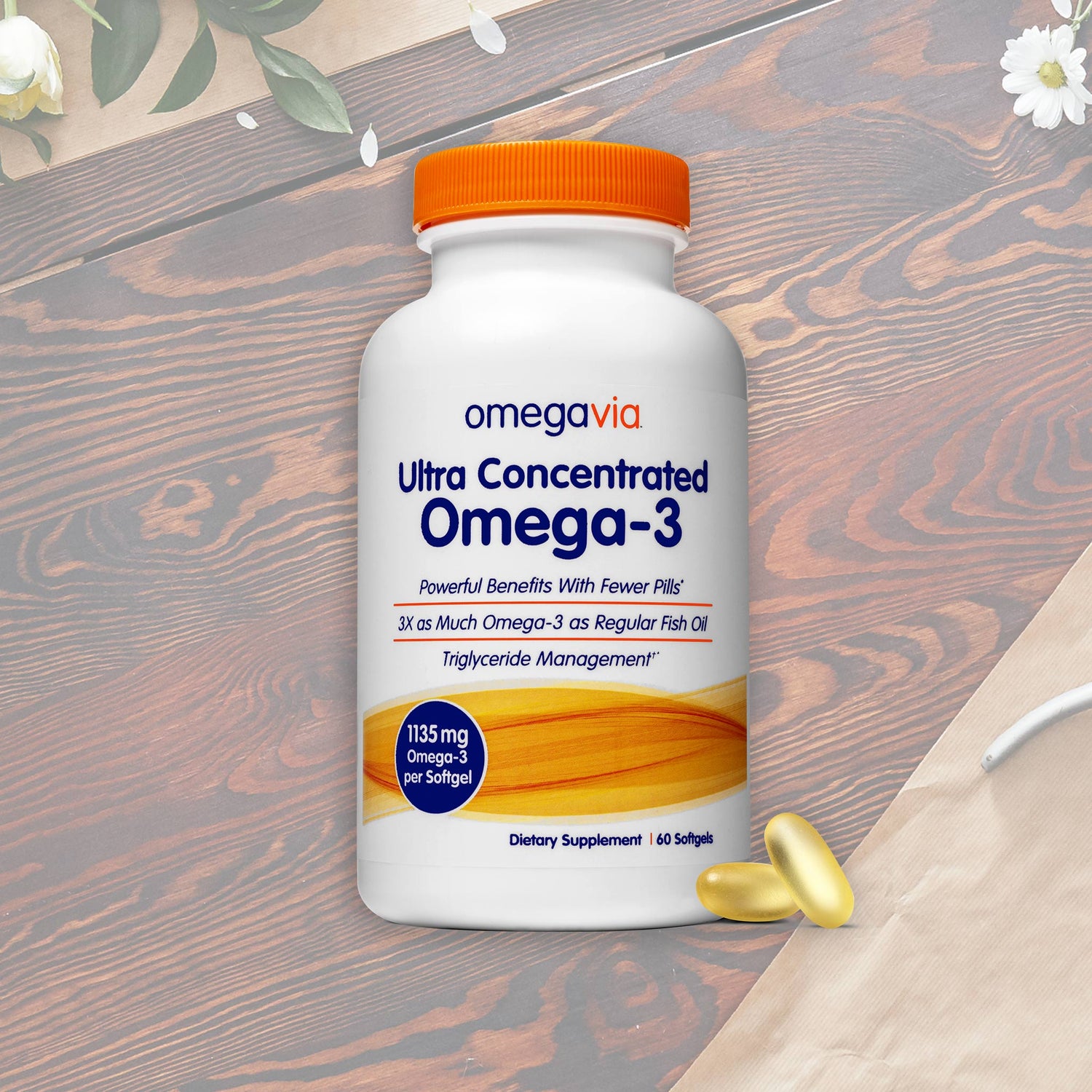 I remember the Time magazine cover on the left. (Don't we all?) But who paid attention to the one (right) published 15 years later?[/caption]
Cholesterol particles are part of the 'gunk' that blocks clogged arteries.
And vegetable oils contain no cholesterol. They actually lower cholesterol.
These are reasons why vegetable oil has been promoted as a 'healthy' alternative to cholesterol-containing animal fats.
I remember the Time magazine cover on the left. (Don't we all?) But who paid attention to the one (right) published 15 years later?[/caption]
Cholesterol particles are part of the 'gunk' that blocks clogged arteries.
And vegetable oils contain no cholesterol. They actually lower cholesterol.
These are reasons why vegetable oil has been promoted as a 'healthy' alternative to cholesterol-containing animal fats.
The popularity of vegetable seed oils
Our food supply is drowning in vegetable oils. They're cheap. They're from vegetables. They sound healthy. What's not to like? You'd think that with all that vegetable goodness, clogged arteries would be a thing of the past. But it's not. In the last few years, I've beat up on Omega-6-rich vegetable oils at every chance I get. Here and here. But that's mostly because excess Omega-6 can produce unhealthy inflammation response*. But reducing Omega-6 in your diet, you can mitigate some of that risk.Vegetable seed oil consumption (lbs/year)
[caption id="attachment_7842" align="alignleft" width="576"] Even though vegetable oils may reduce cholesterol, the net risk from increased Omega-6 intake may be higher than any presumed benefit from lowered cholesterol. Source: National Institute of Health[/caption]
If all you're after is a 'healthy' ratio between Omega-3 and 6, well, then you can out-drown vegetable oils with fish oil. Right? Technically, yes. But there is a serious flaw in this thinking.
There is a problem with excess Omega-6 that Omega-3 cannot cure. Actually, excess Omega-3 is just as much to blame. Are you listening fish-oil-glugging Crossfitters?
It has to do with your LDL cholesterol. Most of us know LDL as the 'bad' cholesterol, playing Joker to HDL's Batman. But this aint the movies - it's an over-simplified and inaccurate view of the situation because LDL is critical for healing and immune functions.
Even though vegetable oils may reduce cholesterol, the net risk from increased Omega-6 intake may be higher than any presumed benefit from lowered cholesterol. Source: National Institute of Health[/caption]
If all you're after is a 'healthy' ratio between Omega-3 and 6, well, then you can out-drown vegetable oils with fish oil. Right? Technically, yes. But there is a serious flaw in this thinking.
There is a problem with excess Omega-6 that Omega-3 cannot cure. Actually, excess Omega-3 is just as much to blame. Are you listening fish-oil-glugging Crossfitters?
It has to do with your LDL cholesterol. Most of us know LDL as the 'bad' cholesterol, playing Joker to HDL's Batman. But this aint the movies - it's an over-simplified and inaccurate view of the situation because LDL is critical for healing and immune functions.
Omega-6, LDL and atherosclerosis
LDL particles get blamed because of their role in atherosclerosis. It's not because too much LDL 'clogs up your pipes,' like a highway with too many cars. That too is an over-simplified and inaccurate notion. It's a much more complicated and layered situation. There are people with very high LDL who never get heart attacks. And those with low LDL that do. Yet, most cardiologists agree that LDL particle size and number should be watched. Something happens to the LDL that causes it to 'go rogue.' And that something is oxidation. You can leave a stick of butter or tub of coconut oil at room temperature and they won't go rancid. The fats in these are 'saturated' and so they are inert - don't go rancid. Do the same with vegetable oil, flaxseed oil or Canola…and you have a stinky mess in a few weeks. Same with fish oil. Why? Because vegetable oils and fish oil have delicate polyunsaturated fats that can oxidize or go rancid when exposed to oxygen. And that is a problem.The problem with Oxidized LDL
The fats you eat end up on the outer membrane of each of your cells. So if you eat a lot of Omega-6-rich vegetable seed oils (think fried foods like french fries), your cell membranes will have more Omega-6 fats. Similarly, the membranes of the LDL particles will also contain high levels of Omega-6 fats. After all, you are what you eat. The Omega-6 from those super-sized french fries ends up on your LDL particle. And it goes rancid while attached to the cell membrane of your LDL. It 'rots on the vine' so to speak. In effect, your LDL particles become rancid. Damaged. Oxidized. It's called Oxidized LDL (oxLDL). There are other reasons why LDL oxidizes but this one's a biggie. When the Omega-6 fats in your LDL cell membrane oxidizes, your immune system recognizes it as a threat to your arteries and blood vessels. And the clean-up process forms a plaque to protect you from harm. When these plaques fall apart after years of build up, inflammation and oxidation, you have the recipe for a heart attack. No amount of fish oil will save you here. Exercise will not reverse oxidized LDL either. You MUST get at this from your diet.The tipping point...
Seed oil driven oxLDL started when we began switching to vegetable oils from fear of animal fat and cholesterol (see graph above.) And when we stopped eating butter and started eating margarine, fast food, and take-out. I still remember my mom switching from butter to I Cant Believe Our Lifespan is so Short. We thought we were doing the right things. But all of these things increase your Omega-6 load. Remember that Time magazine cover with the sad bacon face? I do - I was in high school. I switched to soy sausages, corn oil, and low-fat milk on my frosted flakes. (Good Lord! What was I thinking?!) While your great-grandmother had LDL particles too, hers had more of the stable saturated and monounsaturated fats from eating butter, lard and tallow. Your LDL, on the other hand, contain delicate polyunsaturated fats from vegetable oils. There is a difference. Your LDL is more likely to oxidize than Great-grandma Eunice's.The cardinal rule of Omegas
Our bodies are built to run on small quantities of Omega-3 and Omega-6. Both are essential, but in small quantities - no more than a few grams of each per day. Without either, you die. But the cardinal rule of Omegas 3 and 6 is small quantities. Eat a Mickey Ds french fry? Oops! Your need for counter-balancing Omega-3s just went up. You'd better eat some salmon or a fish oil supplement. OK - technically, you're 'balanced.' But your just broke the cardinal rule and entered a biological rabbit hole. If you want out of the rabbit hole, the only solution is to cut out dietary Omega-6. We're in the middle of a never-before-conducted human experiment of cooking everything with vegetable oils. And we need to stop and think about the effects of eating incredibly artificial amounts of Omega-6.Why you should care about oxidized LDL
People with high oxidized LDL (or oxLDL) are four times more likely to have heart attacks than those with low oxLDL.
You may gain comfort in knowing that vegetable oils reduce cholesterol, but it also oxidizes what's left and possibly increases death rates from cardiovascular and coronary artery diseases. OxLDL is involved in the early stages of heart disease and artery damage. OxLDL is a much better predictor of heart disease than LDL and HDL. Certainly better than total cholesterol. LDL is a toss up - with it, you can predict heart disease half the time. But with oxLDL, you can predict heart disease with 82% accuracy. Small dense LDL, the kind that goes up with low-fat/high-carb diets, are particularly vulnerable to becoming oxidized and causing blocked arteries. Another reason to cut down on sugar and refined carbs.Your body's defense: natural, built-in antioxidants
Your liver expects some LDL oxidation, so it packs all LDL with CoQ10 for antioxidant protection. But that statin drug you've been taking for cholesterol reduction...well, it wipes out your CoQ10 production. Oops! So...you're gulping down Omega-6 fats...and your cholesterol meds have wiped out the only built-in protection your body can offer you. Nice going! [caption id="attachment_10265" align="alignleft" width="576"] Cholesterol lowering statin drugs reduce CoQ10 that your liver bundles with LDL to protect it from oxidation.
Cholesterol lowering statin drugs reduce CoQ10 that your liver bundles with LDL to protect it from oxidation. Adapted from Folkers et al., Lovastatin decreases coenzyme Q levels in humans. Proc Natl Acad Sci U S A. 1990 Nov;87(22):8931-4.[/caption] Doctors are still quick to prescribe statin drugs for lowering cholesterol, without much discussion about the risk of excess vegetable oils or oxLDL. In some people, this added risk from statins is worth it. Is it for you? Ask your doctor. For me, no. In the next installment, we'll take a look at some of the factors that increase LDL oxidation and steps you can take to protect yourself. Hint: you can't take a pill to reverse oxLDL. Sorry. Some risks can ONLY be reduced with a dramatic change in your diet. *These statements have not been evaluated by the Food and Drug Administration. This product is not intended to diagnose, treat, cure, or prevent any disease.



